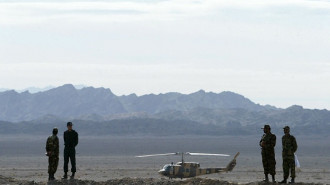Sudan rejects Egypt official offer on disputed border region
After obstructing the 2004 Four Freedoms Agreement that would have permitted free movement, residence, work and ownership in both countries, Egypt recently offered to implement its terms in the disputed mineral-rich border region, a government official told Egyptian website Mada Masr.
Relations between Egypt and Sudan have recently been fraught with tension, with Khartoum renewing its claim to the Halayeb Triangle, a dispute that dates back to British colonial times.
Sudan first submitted a complaint against Egypt over the territory to the UN Security Council in 1958, claiming sovereignty over the triangle. It renews the complaint annually, and it recently described Egypt's presence in the area a "military occupation".
However, Egypt maintains full sovereignty over the region and refuses to submit the dispute to international arbitration.
Sudan's refusal of the Egyptian offer comes amid strained relations, after Khartoum on Tuesday banned the import of agricultural and animal products from Egypt, and redirect any imports from other countries that would otherwise pass through Egypt.
Trade between Cairo and Khartoum amounts to about $850 million annually, with Egyptian exports to Sudan primarily consisting of fruit, vegetables, fish, canned food and textiles.
The import ban decision came just days after Sudanese President Omar Bashir accused Egyptian intelligence services of supporting rebels fighting his troops in Darfur, a charge angrily denied by Egypt.
"The Sudanese army has captured several Egyptian armoured vehicles in recent fighting in Darfur," Bashir said last week.
 |
After obstructing the 2004 Four Freedoms Agreement that would have permitted free movement, residence, work and ownership in both countries, Egypt recently offered to implement its terms in the disputed mineral-rich border region |  |
He has previously accused Egyptian intelligence services of supporting opposition figures fighting his troops in Darfur and the conflict zones of Blue Nile and South Kordofan.
Tens of thousands of people have been killed in these three regions where local African ethnic groups have been fighting Sudanese government forces for years, accusing Khartoum of economically marginalising the regions.
The Egyptian media has also accused Khartoum of offering refuge to members of the Muslim Brotherhood movement, which was declared a "terrorist group" by Cairo following the ouster of Islamist president Mohamed Morsi in 2013.
The two countries have been engaged in high-level diplomatic initiatives to improve their relations, but their efforts have so far not yielded any positive results.
Sudan's foreign minister Ibrahim Ghandour has called off a visit to Cairo scheduled for this week, citing "domestic" issues, after his Egyptian counterpart Sameh Shoukry cancelled his April visit to Sudan, according to Egyptian news reports.However, both ministers have agreed to meet in Cairo on Saturday for talks.
![Ghandour and Shoukry [AFP] Ghandour and Shoukry [AFP]](/sites/default/files/styles/large_16_9/public/media/images/F1B568BF-157F-4FBB-9FAA-0FF4B239C0F8.jpg?h=d1cb525d&itok=QV0LfCNG)
![Palestinians mourned the victims of an Israeli strike on Deir al-Balah [Getty]](/sites/default/files/styles/image_684x385/public/2024-11/GettyImages-2182362043.jpg?h=199d8c1f&itok=xSHZFbmc)


![The law could be enforced against teachers without prior notice [Getty]](/sites/default/files/styles/image_684x385/public/2178740715.jpeg?h=a5f2f23a&itok=hnqrCS4x)
 Follow the Middle East's top stories in English at The New Arab on Google News
Follow the Middle East's top stories in English at The New Arab on Google News
![Fakhrizadeh [AFP] Fakhrizadeh [AFP]](/sites/default/files/styles/image_330x185/public/media/images/774C39F7-8F7A-4D67-B998-27D102FCB4A7.png?h=d1cb525d&itok=j9eGvunV)

